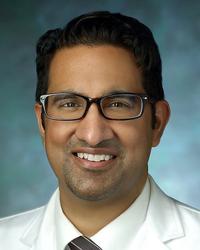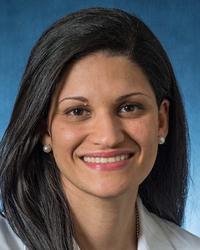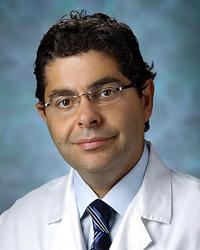Research Lab Results
-
Neuro-Oncology Surgical Outcomes Laboratory
Directed by Debraj “Raj” Mukherjee, MD, MPH, the laboratory focuses on improving access to care, reducing disparities, maximizing surgical outcomes, and optimizing quality of life for patients with brain and skull base tumors.
The laboratory achieves these aims by creating and analyzing institutional and national databases, developing and validating novel patient-centered quality of life instruments, leveraging machine learning and artificial intelligence platforms to risk-stratify vulnerable patient populations, and designing novel surgical trials to push the boundaries of neurosurgical innovation.
Our research also investigates novel approaches to improve neurosurgical medical education including studying the utility of video-based surgical coaching and the design of new operative instrumentation.
-
The Atlantic Cardiovascular Patient Outcomes Research Team - Atlantic C-PORT
Our research is centered on the safety, efficacy and outcomes of PCI performed at hospitals without on-site cardiac surgery. Active projects: C-PORT Randomized Studies and Registries; New Jersey Angioplasty Demonstration Project; InCar-decision support tools for performance of PCI at hospitals without on-site cardiac surgery. For more information please visit Cport.org.
-
Outcomes After Critical Illness and Surgery Group
The Outcomes After Critical Illness and Surgery Group is focused on understanding and improving patient outcomes after critical illness and surgery. Research projects include improving long-term outcomes research for acute respiratory distress syndrome/acute respiratory failure (ARDS/ARF) patients; examining the long-term outcomes for acute lung injury/acute respiratory distress syndrome (ALI/ARDS) patients; and evaluating the effects of lower tidal volume ventilation and other aspects of critical illness and ICU care on the long-term physical and mental health outcomes of ALI/ARDS patients. -
Improving Outcomes Following Injury and Illness
Led by Stephen Wegener, Ph.D, this research group focuses on projects that have the potential to improve function and quality of life and reduce disability following injury or illness. These projects include research on cognitive, behavioral, psychological and health care system factors that affect outcomes following injury. -
Spinal Column Surgical Outcomes Lab
The Spinal Column Surgical Outcomes Laboratory aims to improve the neurological outcomes and functional capacity of patients undergoing spinal surgery. We collect large-scale retrospective patient databases and prospective patient registries to report high-quality data relating to the outcomes of neurosurgical operations. The laboratory participates in the National neurosurgical Quality and Outcomes Database (N2QOD). This multi-institutional collaboration has set forth a 3-year prospective study to benchmark quality and surgical outcome measures across several academic institutions. The Spinal Column Surgical Outcomes Laboratory specializes in biostatistical analysis of large-scale clinical databases, studying the outcomes of traditional and novel spinal procedures, quality control and cost-effectiveness research and clinical trials relating to spinal surgery outcomes. -
Spine Outcomes Research Center
The Spine Outcomes Research Center is a multidisciplinary group committed to improving patient outcomes and applying high-quality and purposeful research to professional practice. The organization values collegial interaction and strong scientific principles. -
David Thompson Lab
Researchers in the David Thompson Lab examine the outcomes of patients treated in intensive care units (ICUs), patient safety efforts, quality improvement efforts, and multidisciplinary teamwork and safety curriculum development. We're taking part in a study aimed at reducing hospital-acquired infections among cardiovascular surgery patients. Our investigators also participated in a clinical research collaboration that saw an 81 percent reduction in bloodstream infections related to central lines.
-
Elizabeth Hunt Lab
Researchers in the Elizabeth Hunt Lab study innovative ways to improve the care quality and clinical outcomes of children who suffer cardiopulmonary arrest. Our work includes implementing rapid-response systems, capturing and analyzing cardiac-arrest data, and redesigning medical devices and simulators. We've introduced novel simulation approaches to education, including data-driven debriefing and the Rapid Cycle Deliberate Practice approach.
Principal Investigator
Department
-
Nicholas Rowan Lab
Dr. Rowan is actively involved in both outcomes and translational research relating to chronic rhinosinusitis and endoscopic skull base surgery. He has a keen interest patient-reported quality of life outcomes as well as those that pertain to smell and taste. Dr. Rowan is also involved in sinus-related clinical trials, pursuing new medical therapies and technological advancements for the treatment of patients with chronic rhinosinusitis.
-
Natasha Chida Lab
The Natasha Chida Lab investigates methods for using education and curriculum development to improve patient outcomes worldwide, primarily by optimizing education of physicians-in-training. Most recently, our team has worked to develop and evaluate an assessment tool for evaluating internal medicine residents’ understanding of tuberculosis diagnostics. Previous research includes a retrospective cohort study on the high proportion of extrapulmonary TB in a low-prevalence setting as well as an analysis of ways to define clinical excellence in adult infectious disease practice.




